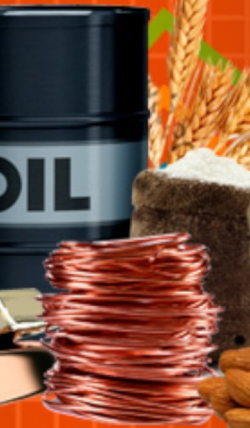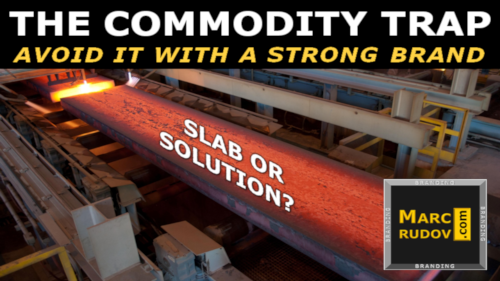 Nothing negatively pressures a company’s prices and profits like the marketplace relegating it to commodity status.
Nothing negatively pressures a company’s prices and profits like the marketplace relegating it to commodity status.
A commodity is a raw material or finished product that customers deem indistinguishable from like materials and products, regardless of source.
Customers typically view commodity suppliers as interchangeable and make purchases from them based on price and delivery.
A hallmark of commodities: their worldwide prices are similar and rise and fall in tandem, based on demand and supply.
Corn is a commodity. Oil is a commodity. Copper is a commodity. Steel is a commodity.
Steel? Isn’t steel a variable finished product? Yes.
There are different shapes (sheets, beams, rods, coils, tubes, plates) and grades (tool, carbon, alloy, stainless) of steel.
But, with few exceptions, the world’s 100+ suppliers make the same products — or similar variations thereof.
About half of all steel purchased is for construction and infrastructure — buildings, bridges, pipes, etc. When President Trump talks about fixing infrastructure, CEOs of steel companies salivate.
The China Factor
The US once led the world in production (40 percent in the 1920s) and consumption, but now it produces only five percent and, as the world’s largest importer, consumes only nine percent of global steel output.
After World War II, as European and Asian countries rebuilt their demolished infrastructures, their demand for steel popped. Then, developing nations began to explode with growth. So, American consumption, as a percentage of the world’s total, naturally dropped.
But, why did the American production number tank so drastically?
Arrogance: US steel suppliers ignored imports and failed to modernize and cut costs — both operating costs and labor costs, which the United Steelworkers union controlled.
Alternatively, aggressive European, Indian, Japanese, Korean, and Chinese steel suppliers hit their respective accelerators, eventually surpassing their American competitors.
Fast-forward to present-day.
China supplies half (four of the world’s top-ten steel producers are in China) and consumes half of the world’s steel output. Accordingly, its discounting power and economy affect global prices more than any other factors.
Even though the US gets only six percent of its steel imports from China, American suppliers must dance to China’s bargain-basement-prices tune — because it controls global prices. If prices fall too far, US suppliers often close plants and choose not to invest in others.
Enter Donald trump.
Wanting to stimulate a steel renaissance, President Trump, in March 2018, levied a 25-percent tariff (AKA Section 232) on China’s steel, to, as they say, level the playing field.
David Burritt, CEO of US Steel Corporation, decided to use Trump’s tariff as an incentive to reopen Granite City Works in Illinois. President Trump visited the plant on July 26th to celebrate.
China isn’t reacting well to this tariff.
The US and China are now engaged in a trade war, involving multiple products in addition to steel, and China’s economy is faltering.
Differentiation, Specialization, and Focus
From a CEO’s point of view, though, is a tariff a sustainable competitive remedy? Is a level playing field realistic? Is it wise to depend on a single man, President Trump?
Negative to all three.
American steel companies must manage as if Trump weren’t president.
Do you think automobile companies use steel in their cars because they love steel? Hell no. They do so because steel is the best price/performance solution (AKA value), until they find something better.
In fact, increasingly they’ve employed plastics and composites, and, in 2015, Ford made its F150 pickup truck with aluminum, shaving off 700 pounds.
Nobody worships steel, except the steel manufacturers. That’s the commodity trap.
Steel companies must stop thinking of themselves as steel companies. They must cease producing commodities and start delivering solutions.
They must excel at branding: differentiation, specialization, and focus.
Operational Excellence Is No Longer Sufficient
Steve jobs is famous for saying, after returning to Apple in 1997 and canceling many projects, “I’m as proud of what we don’t do as I am of what we do.”
The steel companies must follow suit. What unprofitable products and processes can you eliminate? What unprofitable plants can you shutter and sell?
On the plus side, should you start selling aluminum, composites, plastics? Should you offer design services?
The answers to these questions depend on your brand — your unique, customer-validated value proposition. Hint: Your company name is not a brand.
According to Jeff Durr of Gallup, who’s interviewed 200 steel buyers, operational excellence (cost, quality, delivery) is no longer sufficient. This is what commodities vendors sell.
That’s right. Your customers want account reps who know their companies, their problems, their production schedules, their customers — intimately.
FYI: Intimate knowledge of and responsiveness to customers is called Sales 101.
Do your account reps know their accounts intimately? Are they selling slabs or solutions? Do they know how their accounts feel about your company?
Parting Advice to CEOs
The only way to avoid the commodity trap (or to exit it) is to create a strong brand.
NOTE: Although creating a strong brand is likely a foreign concept to you, because you’re accustomed to manufacturing commodities, it is mandatory.
The brand is a value proposition, articulated in customer language, approved by customers. It describes the connection your company has with its customers.
The brand sets your company’s purpose and direction. It is not your company’s name and is not about your company’s products or heritage. It is your #1 priority.
Remember, buyers of steel are like buyers of anything else: They want value, not products. And, they want a first-class customer experience.
You have a choice: Heed the aforementioned advice, or you’ll be picnicking and rollerblading on the site where your plant used to sit.
AFTERWORD
Rumors abound that the United Steelworkers will strike against US Steel and other suppliers. A shutdown, obviously, will invalidate everything written above.
CEOs of steel suppliers must reduce the labor components of their businesses through innovation and automation. Being vulnerable to walkouts and shutdowns does not bode well for long-term sustainability and competitiveness.
POSTSCRIPT #1: Trump Tariffs Bearing Fruit; Steel Imports Drop (08.29.18)
POSTSCRIPT #2: Trump Grants Tariff Exemption to Korea; USS’s Stock Falls 4.4% (08.30.18)
POSTSCRIPT #3: United Steelworkers Threaten Strike Against USS (09.10.18)
POSTSCRIPT #4: US Steel’s Offer to the United Steelworkers
POSTSCRIPT #5: USW Demands Tariff’s Benefits from USS and ArcelorMittal (09.11.18)
POSTSCRIPT #6: USW Unhappy With US Steel’s Latest Contract Offer (09.12.18)
POSTSCRIPT #7: Should the US Be Competing in Commoditized Industries?
POSTSCRIPT #8: US Steel Reaches Tentative Agreement With USW (10.15.18)
POSTSCRIPT #9: Ford: American Steel Most Expensive Because of Tariffs
POSTSCRIPT #10: Foreign Steel Keeps Flowing Into US Despite Tariffs
POSTSCRIPT #11: The World Is Awash in Steel Capacity
POSTSCRIPT #12: US Steel Companies Face Downturn Despite Trump Claims of Revival
POSTSCRIPT #13: Steel Dynamics Clocks Record Profits as Tariffs Drive Up Prices
POSTSCRIPT #14: USS Ups 4Q18 Earnings, Misses Expectations Despite Tariff Boost
POSTSCRIPT #15: US Steel, Buoyed by Tariffs, to Build EAF in Birmingham in 2020
POSTSCRIPT #16: Trump’s Tariffs Will Boost Steel Price to $800 per Net Ton (03.15.19)
POSTSCRIPT #17: Nucor Founder Predicted in 1986 Tariffs Would Kill Steel (08.12.19)
POSTSCRIPT #18: US Steel Buys 49% of Big River Steel (10.01.19)
POSTSCRIPT #19: Trump’s Tariffs Have Hurt the Steel Industry (10.29.19)
© 2018 Marc H. Rudov. All Rights Reserved.
About the Author

Marc Rudov is a branding advisor to CEOs,
producer of MarcRudovTV, and author of four books


